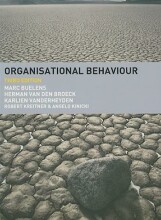Summary: Organisational Behaviour | 9780077107239 | Marc Buelens, et al
- This + 400k other summaries
- A unique study and practice tool
- Never study anything twice again
- Get the grades you hope for
- 100% sure, 100% understanding
Read the summary and the most important questions on Organisational behaviour | 9780077107239 | Marc Buelens, Herman van den Broeck, Karlien Vanderheyden, Robert Kreitner, Angelo Kinicki.
-
1 Foundations of Organisational Behaviour
-
What scandal did the NII had to confront with? (first case study)
A group of workers falsified important quality control data for an experimental, mixed plutonium and uranium fuel. Instead of performing the tests, the workers copied old figures from previous batches. -
What did the NII discover in its first report concerning the matter?
That they were facing a lack of high-quality systems and improper management accross the plant. -
What was the feedback given to the senior management from UK's nuclear watchdog?
A combination of the nature of the job, the lack of supervision and poor training led to the procedural failures. -
What was the HR director's reaction?
In his view, the operators were the ones to blame and not the senior management. -
What should there have been an ephasis on from a managerial point of view?
They should have concentrated more on explaining the significance of security, on awareness training, avoiding actions which the operators would start seeing as pointless. There were obvious inadequacies in the working environment. -
What did Henry Ford say in relation with the fact that people are the key to success in today's competitive business environment?
He affirmed the fact that even if somebody would come to distroy his factories and offices, if he would still have his people he would build the business right back up again. -
Which could be seven people-centered practice in successful companies?
1. Job security (elimination of fear of being laid-off), 2. Careful hire (fit within company culture) 3. Power to people (descentralization and self-managed teams) 4. Generous pay for performance 5. Proper Training 6. Less emphasis on status (we) 7. Trust building (sharing of info) -
When does the history of organisational behaviour start?
It goes as far as the early years of the industrial revolution. -
As what kind of approach did is start with?
It started with a more rational-system view of organisations. -
When did it actualy start developing its human factor side?
This started as late as 1930s, but took several decades so that the OB field was fully developed.
- Higher grades + faster learning
- Never study anything twice
- 100% sure, 100% understanding
































